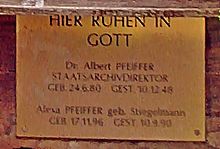Albert Pfeiffer
Albert Rudolph Xaver Pfeiffer (born June 24, 1880 in Rheinzabern , † December 19, 1948 in Gleisweiler ) was a German archivist .
Life
Albert Rudolph Xaver Pfeiffer was born as the son of the Catholic district teacher Franz Xaver Pfeiffer and Anna Maria Barbara Bosch and had thirteen siblings, including the politicians Maximilian Pfeiffer (1875–1926), Anton Pfeiffer (1888–1957) and the diplomat Peter Pfeiffer (1895 -1978).
Albert Pfeiffer studied law at the universities of Munich and Würzburg from 1899 to 1904 . As a student he became a member of the Catholic student associations K.St.V. Ottonia Munich and K.St.V. Walhalla Würzburg in the KV . In 1904 he laid the legal state examination , and received his doctorate a year later at the University of Erlangen Dr. jur. utr. From 1905 he worked in the State Archives Speyer and from 1908 he was also the archivist of the city of Speyer. In the First World War he served as a reserve lieutenant from 1915 to 1918.
In 1919 he became editor of the Palatinate Museum magazine . He was the only German to take part in a French archive commission led by Charles Schmidt , which looked for sources related to France in the Rhenish archives. The so-called Rhineland inventory was controversial and its involvement was criticized in its 1948 obituary.
In 1925 he became general secretary of the Palatinate Society for the Advancement of Science (PGFW). A year later he was appointed head of the Speyer State Archives and in 1930 State Archives Director. Where he served until 1937, after which he was under pressure from the Nazis into the State Archives Landshut added. Albert Pfeiffer then applied for membership in the NSDAP . In 1940 he was allowed to return to the Speyer State Archives due to the war.
During World War II , he served as a senior war administrator in the administrative staff of the military commander in France. At the end of 1941 he was withdrawn from the archives group in France and again director of the Speyer State Archives.
After the end of the Second World War, he became an advisor on archival and library matters to the regional council of Rheinhessen-Pfalz. In poor health, he died four months after his 40th service anniversary.
A street in Speyer was named after him.
Works
- The archive of the city of Speyer , Festschrift 1912, Flickr , Archivalia
literature
- Karl Heinz Debus (Ed.): The State Archives Speyer . In: Publications of the Landesarchivverwaltung Rheinland-Pfalz , Volume 40, Koblenz 1987, ISBN 3-922018-54-8 . On Albert Pfeiffer and his brothers p. 31 f.
- Wolfgang Freund: People, Empire and Western Frontier. German studies and politics in the Palatinate, Saarland and annexed Lorraine 1925–1945 (= publications of the Commission for Saarland State History and Folk Research . No. 39 ). Commission for Saarland State History and Folk Research, Saarbrücken 2006, ISBN 3-939150-00-2 , p. 178-179 .
Web links
- Helmut von Jan : Obituary for Dr. Albert Pfeiffer on the official Flickr account of the Speyer City Archives
Individual evidence
- ^ Siegfried Koß, Wolfgang Löhr (Hrsg.): Biographisches Lexikon des KV. 7th part (= Revocatio historiae. Volume 9). Akadpress, Essen 2010, ISBN 978-3-939413-12-7 , p. 114 f.
- ^ Wolfgang Hans Stein: Archives as objects of cultural imperialisms: French archives in Germany - German archives in France . In: Michael Espagne, Katharina Middell, Matthias Middell (eds.): Archive and memory . Leipziger Universitätsverlag, Leipzig 2000, ISBN 978-3-934565-30-2 , p. 115 .
| personal data | |
|---|---|
| SURNAME | Pfeiffer, Albert |
| ALTERNATIVE NAMES | Pfeiffer, Albert Rudolph Xaver (full name) |
| BRIEF DESCRIPTION | German archivist |
| DATE OF BIRTH | June 24, 1880 |
| PLACE OF BIRTH | Rheinzabern |
| DATE OF DEATH | December 19, 1948 |
| Place of death | Gleisweiler |

